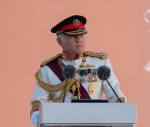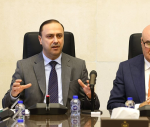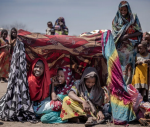With the Winter Olympics under way in Sochi, Russia is again in the global spotlight — and President Vladimir Putin is taking the opportunity to present his country as a resurgent power.
But beneath the swagger and fanfare lie serious doubts about Russia’s future.
In fact, long-term price trends for the mineral resources upon which the economy depends, together with Russia’s history (especially the last two decades of Soviet rule), suggest that Putin’s luck may well be about to run out.
Mineral-resource price cycles generally begin with a rise lasting 8-10 years, followed by a longer period of stable, relatively low prices.
Given that prices have been on an upswing since the middle of the last decade, they should begin declining within two years, if they have not done so already. Moreover, the last price trough lasted more than 20 years, implying that Russia cannot expect simply to wait it out.
But, beyond acknowledging the need to cut spending — an obvious imperative, after the estimated $50 billion cost of the Sochi Olympics — Putin has not signalled any concrete plans to tackle Russia’s economic weaknesses.
Russia faced a similar challenge in the 1970s and 1980s — and, like Putin today, its leaders failed to do what was needed.
According to former prime minister Yegor Gaidar, who led Russia’s only post-Soviet government that was oriented towards systemic change, the socialist command economy exhausted its growth potential by 1970.
Under non-totalitarian circumstances, the threat of stagnation would have generated strong pressure for systemic reform.
But the Soviet Union’s ageing communist leadership, encouraged by the OPEC-generated oil-price explosion and the discovery of massive hydrocarbon reserves in western Siberia, took a different tack, using natural-resource revenues to finance continued military expansion.
In an effort to appease the public, the Soviet leadership increased food imports — both directly (meat imports, for example, quintupled from 1970 to 1980) and indirectly (by increasing feedstock imports).
While this strategy worked in the short term, it caused food consumption to increase far beyond what the economy could sustain.
As a result, the Soviet economy became even more dependent on resource revenues, making it extremely vulnerable to price fluctuations in international commodity markets. When mineral prices began to decline in the early 1980s — reaching their lowest point in 1999 — the economy, which had already been stagnating for about five years, went into a free fall.
Today, the Russian economy is no more resilient than it was in the late Soviet era, with commodities, especially oil and natural gas, accounting for around 90 per cent of total exports and manufacturing for only about 6 per cent.
If anything, the economy’s dependence on exports of fuels and industrial minerals has increased, meaning that smaller price fluctuations have a greater impact on Russia’s fiscal and external position.
Indeed, some observers — including the Central Bank of Russia (CBR) — have predicted that the country’s current account could slip into deficit as early as next year.
A lasting deficit would eliminate the major economic difference between Putin’s Russia and its Soviet counterpart during the 1980s — namely, the financial buffer that has been accumulated over the last decade.
It is this buffer — which amounted to $785 billion in the 2000-2011 period — that protected the economy from a larger shock when the global financial crisis erupted in 2009, and that has financed Russia’s foreign policy initiatives, including its recent cooperation with Ukraine.
The CBR’s warning of twin fiscal and current account deficits assumed that oil prices would remain steady, at $104 per barrel in 2015.
But my expectation that oil prices will decline over the next 3-7 years suggests that Russia’s medium-term prospects are actually considerably worse.
In short, Russia will soon have to confront diminished macroeconomic health, with few options for restoring it. Russia’s uncompetitive manufacturing sector certainly cannot pick up the slack, and this is unlikely to change, given Putin’s unwillingness to pursue the needed shift to a more knowledge-intensive economy.
This new reality will not only affect Russia’s foreign policy and imperial ambitions; it will also undermine the relative social and political stability that has characterised the last decade.
Without resource revenues, the government will struggle to finance the policies and programmes that are needed to placate ordinary Russians.
In this context, the Sochi Olympics, intended to herald Russia’s triumphant return as a global power, may soon come to be regarded as a swansong.
The writer, a professor of international economics at the University of Information Technology and Management in Rzeszow, Poland, and a former member of the Polish president’s Policy Advisory Council, is the author, most recently, of “Economic Futures of the West”. ©Project Syndicate, 2014. www.project-syndicate.org












